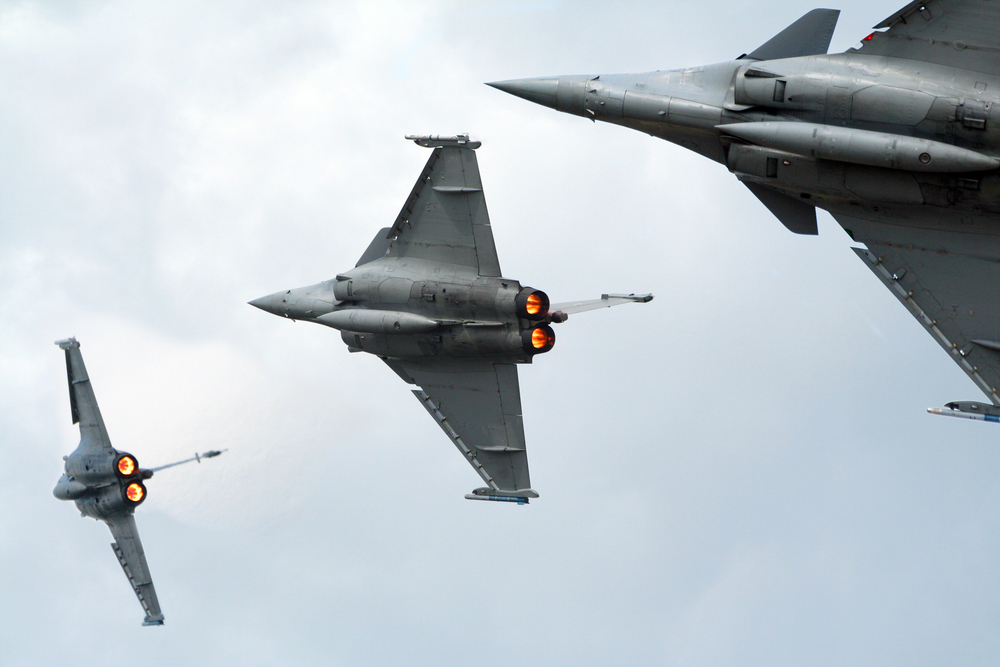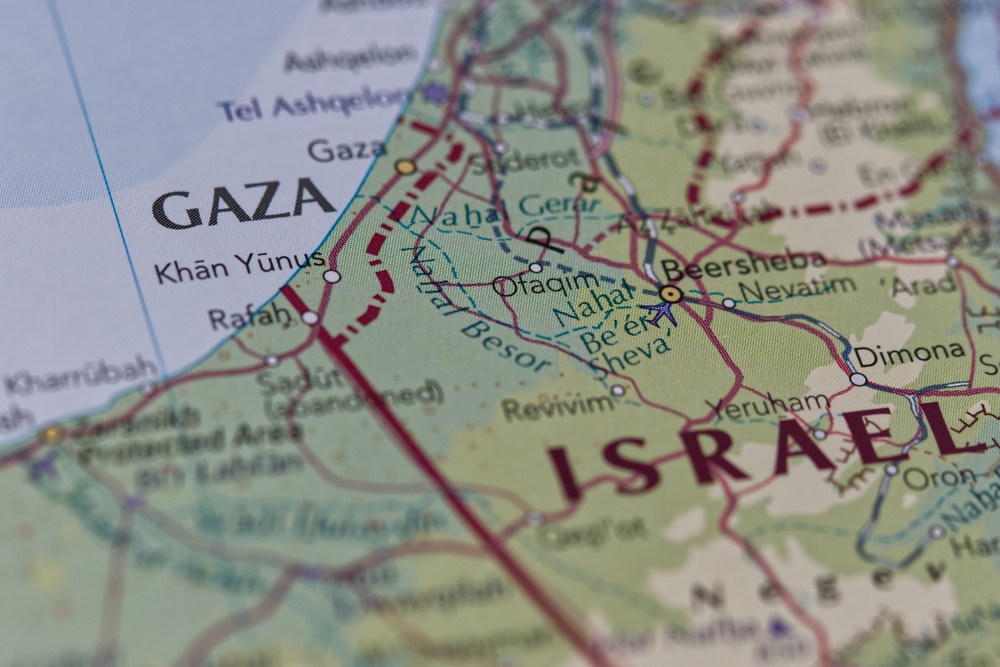
The conflict in the Near and Middle East appears to be moving into a new phase and widening after Iran launched an attack on Israel on the 1st of October in which some 180 ballistic missiles were used, with the Israeli army shooting down most of them. The military incident was intended as Iran’s response to Israel’s actions against the pro-Iranian Shiite group Hezbollah in Lebanon.
It is known that the Israeli army has recently launched ground raids labeling these incursions as limited but Iran’s reaction came immediately and directly on the civilian population with a massive ballistic missile attack. Israel’s raids in Lebanon and the mobilization of additional forces by the Israeli army against the Lebanese movement are being described as the biggest escalation of the regional war since fighting broke out in the Gaza Strip a year ago.
The imminent attack by Iran was anticipated by the Israeli army, which urged the population to take shelter in safe areas shortly before the bombing. The killing of Hezbollah’s leadership in southern Lebanon by the Israeli army, which Iran considers its allies, prompted the government in Tehran to retaliate in a brutal way by launching the most powerful attack in the Middle East in a decade.
The US reaction to Iran’s attack on Tuesday was swift. This was confirmed by President Joe Biden’s statement after a meeting with Vice President Kamala Harris and the White House national security team that the United States is prepared to help Israel defend itself against Iranian attacks and protect US troops stationed in the conflict zone. To this end, Biden ordered the US armed forces to help Israel defend against and shoot down the ballistic missile attack launched by Iran. Therefore the vast majority of the ballistic missiles launched Tuesday night by Iran were intercepted by the air defense systems of Israel, the US, Britain and Jordan, according to official statements.
“We discussed how the United States is prepared to help Israel defend against these attacks and protect American personnel in the region,” Biden said on Platform X.
In the spring, on the 13th of April to be exact, the Middle East witnessed a similar incident to the one on the 1st of October. At that time, Iran fired some 350 explosive drones and rockets at Israel in response to an attack on the consulate in Damascus, which was blamed on the Israeli state. Several foreign military forces, including the US, came to Israel’s aid during the armed incident on the 13th of April. Iran’s drones and missiles were intercepted, thus avoiding catastrophic losses for the Israeli people.

Returning to the ballistic missile attack launched by Iran against Tel Aviv on the night of October 1, the Revolutionary Guards said in a statement that this is how they considered responding to the assassination of Hamas and Hezbollah leaders. According to a senior Iranian official, shortly before the attack Tehran informed the Russian Federation, with which it has close ties, and the US was alerted through diplomatic channels. Ties between Iran and Russia have become increasingly cordial in the wake of the war in Ukraine with the Tehran government supplying Russia (according to Antony Blinken last month) with Fath-360 short-range ballistic missiles to support Moscow in the conflict in Eastern Europe.
“In response to the martyrdom of Ismail Haniyeh, Hassan Nasrallah and Abbas Nilforoushan (deputy chief of the Guardians), we targeted the heart of the occupied territories,” the Revolutionary Guards claimed in a statement.
Israel seeks revenge, oil prices rise
It is increasingly certain that in the coming days the powder keg in the Middle East will explode into a full-blown regional conflict once Israel retaliates against Iran’s ballistic missile attack. Military analysts claim that the Israeli military is preparing “Operation Revenge” against Iran. Future Israeli strikes will most likely target Iran’s most vulnerable point, its oil production facilities.
“Iran carried out a grave act tonight and is pushing the Middle East towards escalation. We will act where and when we choose, in accordance with the directives of the political echelons,” Rear Admiral Daniel Hagari, the spokesman of the Israeli Defense Forces (IDF), said on the evening of the Iranian attack.
This information caused the price of oil on the stock exchange to record a significant rise of around 5% in just 24 hours. West Texas Intermediate oil for November delivery rose by $3.41 (5%) to $71.58 per barrel. Brent crude oil contracts for December delivery rose by 4.76% to $75.11 per barrel. These oil price increases are just the beginning because we will see much higher prices as the conflict between Iran and Israel escalates. It should also be noted that during and after Iran’s attack, air traffic in the Middle East changed. Both Israel under attack and Jordan, over which the Iranian ballistic missiles flew, closed their airspace to commercial flights.
Germany and France react swiftly. UN Secretary-General “persona non grata” in Israel
Germany and France, two of the EU’s leading states, were quick to react to the ballistic missile attack on Israel. In front of the National Assembly French Prime Minister Michel Barnier expressed his concern about an escalation of the Iran-Israel conflict labeling the situation extremely serious.
“I am speaking at this moment, it is 7:16 p.m., at a time when the situation is worsening in the Near and Middle East, with an escalation, an attack and a direct conflict that seems to be underway between Iran and Israel. And so an extremely serious situation,” the French head of government told MEPs.
Speaking through Foreign Minister Annalena Baerbock, Germany called on Iran to stop the attack.
“I condemn in the strongest terms the ongoing attack. Iran must cease the attack immediately,” German Foreign Minister Annalena Baerbock wrote on Platform X.
The failure of United Nations (UN) Secretary-General Antonio Guterres to unequivocally condemn Iran’s attack on Israel has earned him “persona non grata” status in Israel. The decision was taken by Israel’s Foreign Minister Israel Katz. The Israeli official considered Antonio Guterres’ reaction to the Iranian attack inadequate and argued that the UN Secretary General did not deserve to tread in Israel. The UN Secretary General’s statement created discontent and was unsatisfactory for Israeli officials. They would have liked the Iranian state to be explicitly condemned for its ballistic missile attack on Israel. Katz also accused Guterres that UN policy has been anti-Israeli since the beginning of the war in the Gaza Strip, citing the fact that the UN Secretary General has never denounced the atrocities committed by Hamas on the 7th of October in southern Israel, nor has he taken steps to declare Hamas a terrorist organization.
“Anyone who cannot unequivocally condemn Iran’s heinous attack on Israel does not deserve to set foot on Israeli soil. We are dealing with an anti-Israeli Secretary General who supports terrorists, rapists and murderers. Israel will continue to protect its citizens and preserve its national status and dignity, with or without Antonio Guterres,” Katz said in an official statement.
What are ballistic missiles and what models did Iran use in its attack on Israel?
Ballistic missiles are powerful weapons capable of carrying explosive payloads over long distances. The possession of these types of weapons is known to confer significant military power on countries possessing them playing an important role in global geopolitics. In many cases these types of weapons are also used as deterrents in the strategic balance.
To reach its target, a ballistic missile is a type of rocket that follows a trajectory (determined largely by gravity and air resistance). To hit a target they are launched vertically or near-vertically and pass through the stratosphere or even into space. This type of weapon is designed to carry nuclear, chemical, biological or conventional warheads (as in Tuesday’s attack) over short, medium or long distances. There are five types of ballistic missiles and there are only 10 countries that have such weapons.
Here are the five known types of ballistic missiles: SRBM – Short Range Ballistic Missiles are missiles that have a range of less than 1,000 km, MRBM – Medium Range Ballistic Missiles can reach targets between 1,000 and 3,500 km; IRBM – Intermediate Range Ballistic Missiles with a range of between 3. 500 and 5,500 km; ICBM – Intercontinental Ballistic Missiles are capable of hitting targets at ranges over 5,500 km; Submarine-launched Ballistic Missiles are launched from submarines, which provides a mobile platform for strategic missile deployment.
The 10 countries that currently have ballistic missiles are: the USA, the Russian Federation, China, France, the United Kingdom, India, Pakistan, North Korea, Israel and Iran.

Regarding the missiles used by Iran in the October 1 attack, according to weapons experts, based on analysis of video footage that captured the moment, it appears that they were variants of the Shahab-3 ballistic missile with a medium-range medium-range. The Shahab-3 missile can carry a warhead from 760 to 1,200 kilograms and the newest variants of the Shahab-3, the Ghadr and Emad missiles, have accuracies of up to 300 meters from their intended targets. Iran also reportedly used the Fattah-1 “hypersonic” Fattah-1 missile and the advanced Kheybar Shekan solid rocket propulsion missile for the first time in this attack.
Two and a half years ago, according to a US calculation, Iran is believed to have about 3,000 ballistic missiles – but the number could be much higher. The launch of the 180 ballistic missiles in a short time (just a few minutes) was intended to exhaust Israeli air defenses. Israel’s interceptor missiles are known to be extremely expensive and their stocks uncertain. Stopping ballistic missiles in flight is mainly the task of the American-Israeli Arrow 3 and Arrow 2 long-range ballistic missile systems. An Arrow missile typically costs 3.5 million dollars. To eliminate the 180 missiles launched by Iran, on a simple calculation, the cost to the state of Israel easily amounted to more than $630 million. For Iran, the cost of producing and using a ballistic missile comes to $100,000. In other words Tuesday’s attack cost both combatant sides over a billion dollars. Was it worth it?



 Subscribe
Subscribe